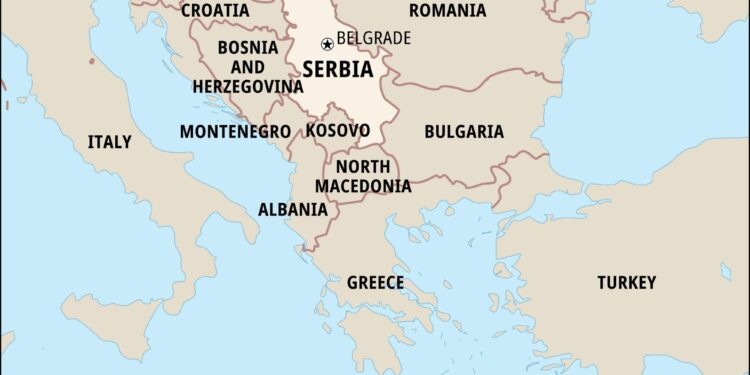Serbia is currently engaged in negotiations with Russia to secure a long-term natural gas supply agreement, according to recent reports. The talks come amid ongoing efforts by Belgrade to ensure energy stability amid fluctuating market conditions and geopolitical tensions in the region. As Europe faces diversifying energy sources, Serbia’s discussions with Moscow highlight the strategic importance of reliable gas imports for the country’s economy and energy security.
Serbia Seeks Strategic Energy Partnership Amid Rising Demand
In response to escalating energy consumption and regional supply uncertainties, Serbian officials have initiated high-level discussions with Russian energy firms to secure a dependable long-term natural gas agreement. This strategic move is designed to ensure energy stability throughout the next decade, supporting both domestic industries and residential needs. With Europe’s evolving energy landscape, Serbia’s efforts reflect a broader trend among nations seeking to diversify and solidify their energy portfolios amid fluctuating international markets.
Key aspects under negotiation include volume guarantees, pricing frameworks, and the incorporation of modern infrastructure investments to optimize gas delivery efficiency. The proposed partnership aims to enhance bilateral energy cooperation, leveraging Russia’s extensive pipeline network and Serbia’s pivotal geographic position. Industry analysts highlight the following potential benefits of the agreement:
- Stable supply to meet rising demand during peak seasons
- Flexible contract terms reflecting market dynamics
- Investment incentives for upgrading energy transit routes
| Parameter | Current Status | Expected Outcome |
|---|---|---|
| Contract Duration | Under Discussion | 10+ Years |
| Annual Gas Volume | 2 Billion mÂł | Up to 3 Billion mÂł |
| Infrastructure Investment | Limited | Enhanced Pipeline Capacity |
Analysis of Potential Economic Impact of Long Term Gas Agreement
Entering a long-term gas agreement with Russia could profoundly reshape Serbia’s economic trajectory by stabilizing energy prices and ensuring consistent supply amid fluctuating global markets. This agreement is expected to reduce Serbia’s vulnerability to energy shocks, fostering a more predictable budget environment for both industries and consumers. Additionally, the deal may unlock opportunities for enhanced industrial output, as businesses could capitalize on lower and more reliable energy costs, subsequently supporting GDP growth and employment rates over the contract period.
However, critical economic implications extend beyond immediate cost savings. Serbia’s energy dependence on Russian gas raises concerns about geopolitical risks and potential constraints on diversification efforts. The terms negotiated will be pivotal, particularly regarding pricing mechanisms and flexibility clauses. Below is a snapshot of potential impacts:
- Price Stability: Mitigation of seasonal price volatility
- Investment Appeal: Attracting foreign direct investment via reliable infrastructure
- Energy Security: Balancing supply security with diversification priorities
- Fiscal Impact: Predictable state revenue streams through energy taxation
| Factor | Potential Benefit | Potential Risk |
|---|---|---|
| Energy Pricing | Stable long-term rates | Exposure to Russian pricing policy |
| Economic Growth | Boost in manufacturing sectors | Overdependence on one energy source |
| Geopolitics | Strengthened bilateral ties | Vulnerability to sanctions or conflicts |
Experts Recommend Diversifying Energy Sources to Enhance National Security
Leading energy analysts emphasize that reliance on a single major supplier exposes nations to geopolitical risks and market volatility. By broadening the energy portfolio, countries can reduce vulnerability to supply disruptions and price shocks. This diversification includes integrating renewable energy, exploring regional partnerships, and developing strategic reserves to bolster resilience against unforeseen crises.
Key benefits of diversifying energy sources include:
- Enhanced energy independence and reduced geopolitical leverage from suppliers.
- Increased stability in pricing through access to multiple markets.
- Acceleration of green energy adoption, aiding climate goals alongside security.
- Improved capacity to respond to emergencies and infrastructure failures.
| Energy Type | Security Advantage | Current Usage in Serbia |
|---|---|---|
| Natural Gas | Fast dispatch and flexibility | High |
| Hydropower | Domestic, renewable source | Moderate |
| Solar & Wind | Long-term sustainability | Low |
| Coal | Reliable base load | Significant but decreasing |
In Retrospect
As Serbia continues negotiations with Russia on a long-term gas supply agreement, the outcome could have significant implications for the country’s energy security and regional dynamics. With the evolving geopolitical landscape and the ongoing quest for stable energy sources, both parties appear determined to reach a deal that ensures reliable gas imports for Serbia in the coming years. Analysts will be watching closely as talks progress, assessing the potential economic and political impact on Serbia and the broader Balkan region.
















